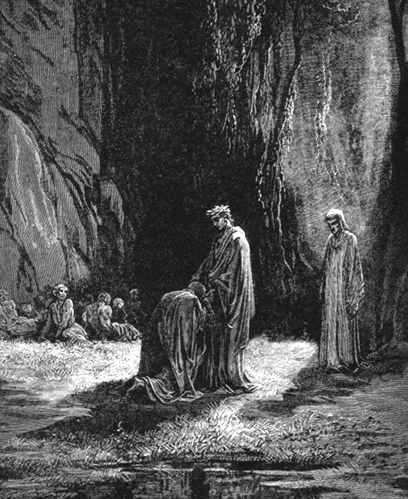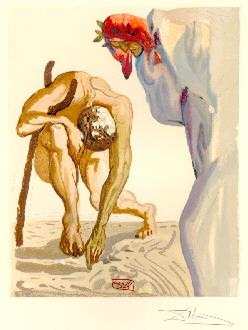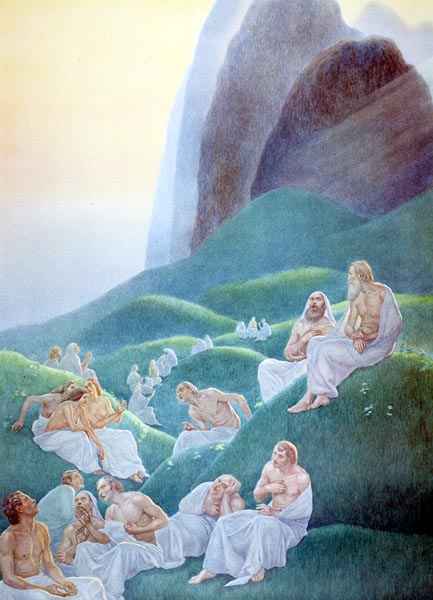 |
 |
 |
|
|
|
|
 |
 |
 |
|
|
|
|
| PURG07 |
|
|
|
|
| ........... | ....... G.GUAITA |
................................. H.W.LONGFELLOW |
...... .D.ALIGHIERI |
....... ... | ....... |
| 1
|
Dop
che
par
trè,
quàt
vòlti i salüt bèj iàn ripetì, Surdèl da cul ambràs as tìra 'ndré e 'l dis:"Ma vùi chi séj?". |
After
the gracious and glad salutations Had three and four times been reiterated, Sordello backward drew and said, "Who are you?" "Or ever to this
mountain
were directed I am Virgilius;
and for no
crime else |
Poscia
che
l'accoglienze
oneste
e
liete furo iterate tre e quattro volte, Sordel si trasse, e disse: «Voi, chi siete?». |
| 4
|
"Prìma
che
vèrs
as
mont
füisu anviarà i ànimi dëgni d' andè 'n Paradìs, 'l mè corp da Utaviàn l'è stat sutrà. |
«Anzi
che
a
questo
monte
fosser volte l'anime degne di salire a Dio, fur l'ossa mie per Ottavian sepolte. |
|
| 7
|
Virgìlio
i
son;
par
ansün'
àuta cùlpa iù pardì 'l cél, che 'd nén avéi la féde". Cuzì 'l mè düca a cul l'ha rispundì. |
Io son
Virgilio; e
per null'altro rio lo ciel perdei che per non aver fé». Così rispuose allora il duca mio. |
|
| 10
|
Mè
cul
che
a
l'impruvìs
as vëd davànti na ròba che i prucüra maravìja, che 'l crëd an po sì 'n po no:"L'è -'l dis-l'è nén" |
As
one who suddenly before him sees Something whereat he marvels, who believes And yet does not, saying, "It is! it is not!" So he appeared;
and then
bowed down his brow, "O glory of the
Latians,
thou," he said, |
Qual
è colui
che cosa innanzi sé sùbita vede ond'e' si maraviglia, che crede e non, dicendo «Ella è... non è...», |
| 13
|
cuzì
'l
fa
cul
e
pö la zbàsa i öc' e ümilmént s' avzìn'a tùrna a lü, e lu 'mbràsa ai ginùj mè n inferiùr. |
tal parve
quelli;
e poi chinò le ciglia, e umilmente ritornò ver' lui, e abbracciòl là 've 'l minor s'appiglia. |
|
| 16
|
"O
glòria
di
latìn
-'l
dis-par al quàl la léngua nòstra l'ha mustrà che val! dal post da 'ndùa i vén etèrnu unùr, |
«O gloria
di Latin»,
disse, «per cui mostrò ciò che potea la lingua nostra, o pregio etterno del loco ond'io fui, |
|
| 19
|
quàl
mérit
o
quàl
gràsia
at fa vnì chi? se mi son dëgn da sénti i to paròli, ti da l'infèrn at vén'i e da quàl sèrc'?". |
What
merit or what grace to me reveals thee? If I to hear thy words be worthy, tell me If thou dost come from Hell, and from what cloister." "Through all the
circles
of the doleful realm," I by not doing,
not by doing,
lost |
qual
merito o qual
grazia mi ti mostra? S'io son d'udir le tue parole degno, dimmi se vien d'inferno, e di qual chiostra». |
| 22
|
"Travèrs
i
sèrc'
che
ién
la giü 'ntl'infèrn - l'ha rispondü '- son mi da chi rivà; 'm mànda virtü' dal cél e i vén cun lé. |
«Per
tutt'i cerchi
del dolente regno», rispuose lui, «son io di qua venuto; virtù del ciel mi mosse, e con lei vegno. |
|
| 25
|
Par
nén
avéj,
e
nén
par avéj fat iù pardü' 'l sul che ti 't völi s'ciarè e che trop tàrdi mi iù cunusü'. |
Non per
far, ma per
non fare ho perduto a veder l'alto Sol che tu disiri e che fu tardi per me conosciuto. |
|
| 28
|
An
post
a
iè
là
giü' sénsa turmént; ma tant a scüri e 'ndùa che i lamént ién né crìj ad dulùr ma mèc suspìr. |
A
place there is below not sad with torments, But darkness only, where the lamentations Have not the sound of wailing, but are sighs. There dwell I
with the little
innocents There dwell I
among those
who the three saintly |
Luogo
è là
giù non tristo di martìri, ma di tenebre solo, ove i lamenti non suonan come guai, ma son sospiri. |
| 31
|
E
lì
mi
'm
trov
cun cit maznà inusént dai dént dla mort murdì ancùra prìma che i füisu dal murtàl pecà ezént; |
Quivi sto
io coi
pargoli innocenti dai denti morsi de la morte avante che fosser da l'umana colpa essenti; |
|
| 34
|
e
lì
iù
'nsèma
cùi
che i trè sànti virtü' iàn nén vistìsi e, sénsa vìsi, iàn bén praticà i àuti, tüti quànti. |
quivi sto
io con
quei che le tre sante virtù non si vestiro, e sanza vizio conobber l'altre e seguir tutte quante. |
|
| 37
|
Ma
se
ti
't
sè
e 't pödi, dà n indìsi parchè i pödu rivè tant pü 'n prèsa là 'ndùa 'l Pürgatori ià 'l vèr inìsi". |
But
if thou know and can, some indication Give us by which we may the sooner come Where Purgatory has its right beginning." He answered: "No
fixed place
has been assigned us; But see already
how the day
declines, |
Ma se tu sai e
puoi, alcuno
indizio dà noi per che venir possiam più tosto là dove purgatorio ha dritto inizio». |
| 40
|
Cuzì
'l
rispònd:"Mi
'n
post
precìs iù nén; andè pü sü mi i pös e girè 'nturn; fin 'ndùa i pös avnì 't farù da guìda. |
Rispuose:
«Loco
certo non c'è posto; licito m'è andar suso e intorno; per quanto ir posso, a guida mi t'accosto. |
|
| 43
|
Ma
't
vëdi
i
mànca
poc che 'l sul va giü, e sü da chi la nöt, 's pöl nén bugè; e donc mè pasè 'l témp l'è méj pensè. |
Ma vedi
già
come dichina il giorno, e andar sù di notte non si puote; però è buon pensar di bel soggiorno. |
|
| 46
|
Ansèma
ién
chi
di
ànimi
a man drìta; se t'è d'acòrdi i pös amnèti a lur 't farà piazì cunòsji, i son sicür". |
Souls
are there on the right hand here withdrawn; If thou permit me I will lead thee to them, And thou shalt know them not without delight." "How is this?"
was the answer;
"should one wish And on the ground
the good
Sordello drew |
Anime sono a
destra qua
remote: se mi consenti, io ti merrò ad esse, e non sanza diletto ti fier note». |
| 49
|
"Mè
l'è suchì; - lü 'l ciàma - se iün
vuléjsa 'ndè sü ad nöt quaidün gliu 'mpedirìa o nén ad muntè sü i fòrsi avrìa?". |
«Com'è
ciò?», fu risposto. «Chi volesse salir di notte, fora elli impedito d'altrui, o non sarria ché non potesse?». |
|
| 52
|
'L
Surdèl
an
tèra
l'frià
'l so dì dizénd:"Nànca da là, vàrda, 'd sa rìga dòpu che 'l sul l'è giü, t' andrìi nén. |
E 'l buon
Sordello in terra
fregò 'l dito, dicendo: «Vedi? sola questa riga non varcheresti dopo 'l sol partito: |
|
| 55
|
Però
nén che i sìa quài àuta nòja,
par andè sü, che i ténebri dla nöt ; cùsti , òltre al nén pudéj, 't gàvu la vòja. |
Not
that aught else would hindrance give, however, To going up, save the nocturnal darkness; This with the want of power the will perplexes. We might indeed
therewith
return below, Thereon my Lord,
as if in
wonder, said: |
non
però ch'altra
cosa desse briga, che la notturna tenebra, ad ir suso; quella col nonpoder la voglia intriga. |
| 58
|
Se
nén muntè, calè 's pöl giü da bas
e spasigè girànd antùrn al mont, fin che 'l dì sta cuarcià sut l'urizònt". |
Ben si poria con
lei tornare
in giuso e passeggiar la costa intorno errando, mentre che l'orizzonte il dì tien chiuso». |
|
| 61
|
Alùra
'l
maèstru
'l
dis
cun maravìja: Mén'ni dònca - lü 'l fa - 'ndùa l'è che 't dìzi, che 's pöda pasè 'l témp ànche spitànd". |
Allora il
mio segnor,
quasi ammirando, «Menane», disse, «dunque là 've dici ch'aver si può diletto dimorando». |
|
| 64
|
Nuj
ieru
zluntanàsi
'n
poc
da lì, e i vëd che a metà costa, iè na val, mè iàn i mont chi 'n tèra precìs uguàl. |
Little
had we withdrawn us from that place, When I perceived the mount was hollowed out In fashion as the valleys here are hollowed. "Thitherward,"
said that
shade, "will we repair, 'Twixt hill and
plain there
was a winding path |
Poco allungati
c'eravam
di lici, quand'io m'accorsi che 'l monte era scemo, a guisa che i vallon li sceman quici. |
| 67
|
Nuj
là - l'ha dit cul' òmbra - adès i andùma
andùa 'ntla còsta iè tam mè na fàuda, e là 'l dì növ ca spònta ia spitrùma". |
«Colà»,
disse quell'ombra, «n'anderemo dove la costa face di sé grembo; e là il novo giorno attenderemo». |
|
| 70
|
Tra
'l
mont
e
'l
piàn iéra 'n santé travèrs, che 'n pòrta giüst al fiànc 'd na spécie 'd cònca cun spònda che sa zbàsa a mèza còsta. |
Tra erto
e piano
era un sentiero schembo, che ne condusse in fianco de la lacca, là dove più ch'a mezzo muore il lembo. |
|
| 73
|
Se
dl'
or
e
dl'argént
fin, carmìniu e biàca, azür, zafìr splendént e cél serén, zmeràld frësc viv, pròpi da poc s'ciapà, |
Gold
and fine silver, and scarlet and pearl-white, The Indian wood resplendent and serene, Fresh emerald the moment it is broken, By herbage and by
flowers
within that hollow Nor in that place
had nature
painted only, |
Oro e
argento fine,
cocco e biacca, indaco, legno lucido e sereno, fresco smeraldo in l'ora che si fiacca, |
| 76
|
füisu
bütà a cunfrònt cun cul giardìn
sarìu da i èrbi e i fiùr tant süperà parchè ad tant pü béj an qualità. |
da l'erba
e da li
fior, dentr'a quel seno posti, ciascun saria di color vinto, come dal suo maggiore è vinto il meno. |
|
| 79
|
Nén
mèc
culùr
l'éra
'd
natüra l'art ma ànche i prufüm l'àva mis'cià 'nsèma e fàni vnì iün sul pròpi speciàl. |
Non avea
pur natura
ivi dipinto, ma di soavità di mille odori vi facea uno incognito e indistinto. |
|
| 82
|
"Sàlve
regìna..."
an
sal
vërd
e 'nsi fiùr satà iù vist là di ànimi i cantàvu che fòra 'd cùla val sa vdìvu nén. |
"Salve
Regina," on the green and flowers There seated, singing, spirits I beheld, Which were not visible outside the valley. "Before the
scanty sun now
seeks his nest," Better from off
this ledge
the acts and faces |
'Salve,
Regina'
in sul verde e 'n su' fiori quindi seder cantando anime vidi, che per la valle non parean di fuori. |
| 85
|
"Prìma
che 'l sul già bas, vàda 'ntal ni, - cumìncia 'l mantuvàn che dès guidàva - rinüncè che da cùsti giü chi 'v mén'a. |
«Prima che
'l poco sole omai s'annidi», cominciò 'l Mantoan che ci avea vòlti, «tra color non vogliate ch'io vi guidi. |
|
| 88
|
Da
chi
'nsl'àut
tàntu
méj
i mòsi e i fàci nutè i pudréj e vëdi 'd tüti quànti; che se i füisi là 'n fond an mès a lur. |
Di questo
balzo meglio
li atti e ' volti conoscerete voi di tutti quanti, che ne la lama giù tra essi accolti. |
|
| 91
|
Cul
là
satà
pü
'nsl'
àut che l'ària ià ad iün che 'l so duvér l'ha trascürà, che 'l dörv nén bùca e 'l làsa cantè i àuti, |
He
who sits highest, and the semblance bears Of having what he should have done neglected, And to the others' song moves not his lips, Rudolph the
Emperor was,
who had the power The other, who in
look doth
comfort him, |
Colui che
più
siede alto e fa sembianti d'aver negletto ciò che far dovea, e che non move bocca a li altrui canti, |
| 94
|
Rodòlfo
imperatùr
l'è
che
'l
pudìva guarì cuj maj che mòri i fan l'Itàlia; bütèi rimédi adès a lè trop tàrdi. |
Rodolfo
imperador fu, che
potea sanar le piaghe c'hanno Italia morta, sì che tardi per altri si ricrea. |
|
| 97
|
L'àut
che
vzìn'a
a
lü
's vëd che lu cunfòrta, l'è 'l rè dla tèra 'ndùa l'àqua i nas che che Mòlta an Albia e Albia 'n mar la pòrta: |
L'altro che ne
la vista
lui conforta, resse la terra dove l'acqua nasce che Molta in Albia, e Albia in mar ne porta: |
|
| 100
|
Otàchero
l'ha
nom,
e
ancù
maznà, püsè 'l valìva ad Venceslào 'l fiö, visiùs barbòn che 'l pénsa a fèsla bén. |
His
name was Ottocar; and in swaddling-clothes Far better he than bearded Winceslaus His son, who feeds in luxury and ease. And the
small-nosed, who
close in council seems Look there, how
he is beating
at his breast! |
Ottacchero ebbe nome,
e ne le fasce fu meglio assai che Vincislao suo figlio barbuto, cui lussuria e ozio pasce. |
| 103
|
E
cul
nazët
che
près
l'è ca 's cunsìglia cun cul che l'ha n aspèt pròpi da bràu l'è mort scapànd e disfiurànd al gìgliu. |
E quel nasetto
che stretto
a consiglio par con colui c'ha sì benigno aspetto, morì fuggendo e disfiorando il giglio: |
|
| 106
|
Vardèlu
là
mè
's
bat
al 'méa cùlpa'! Vardè cul àut che 'l tén pustà la tèsta ansla pàlma dla man e 'ntant suspìra. |
guardate
là
come si batte il petto! L'altro vedete c'ha fatto a la guancia de la sua palma, sospirando, letto. |
|
| 109
|
Iè
pàri
e
msè
'd
cul cl'è 'l mal dla Frànsa; i san la vìta sùa visiùza e spòrca; iu culpìs al sagrìn cun culp ad lànsa. |
Father
and father-in-law of France's Pest Are they, and know his vicious life and lewd, And hence proceeds the grief that so doth pierce them. He who appears so
stalwart,
and chimes in, And if as King
had after
him remained |
Padre e
suocero son
del mal di Francia: sanno la vita sua viziata e lorda, e quindi viene il duol che sì li lancia. |
| 112
|
Cul
ca
l'è
grand
e
gros e che 's cumpàgna, cantànd cun l'àut che l'ha pròpi 'n bèl nas, d'ògni virtü' a l'éra 'n cuncentrà. |
Quel che par
sì membruto
e che s'accorda, cantando, con colui dal maschio naso, d'ogne valor portò cinta la corda; |
|
| 115
|
E
se
dòpu
da
lü
i füisa rastà cul giuvnutìn satà daré da lü, da 'n vas a l'àut l'andàva la virtü'; |
e se re
dopo lui fosse
rimaso lo giovanetto che retro a lui siede, ben andava il valor di vaso in vaso, |
|
| 118
|
cust
pöl
nén
dìzi
ad
l'àut eréde so; dès Giàcu e Federìc a iàn sì i rëgn; ma dl'àuta eredità ansün l'ha pià. |
Which
cannot of the other heirs be said. Frederick and Jacomo possess the realms, But none the better heritage possesses. Not oftentimes
upriseth through
the branches Eke to the
large-nosed reach
my words, no less |
che non
si puote
dir de l'altre rede; Iacomo e Federigo hanno i reami; del retaggio miglior nessun possiede. |
| 121
|
'L'è
bén rar che virtü' da i tronc la pàsa;
cuzì 'l völ cul che l'è padròn da dèla: che i ricòrdu che a lü as dév ciamèla. |
Rade
volte risurge
per li rami l'umana probitate; e questo vole quei che la dà, perché da lui si chiami. |
|
| 124
|
Anche
al
nazòn
i
van
i mè paròli; e al Péru che cun lü l'è près che 'l cànta e tant l'è fat stè mal Püglia e Pruénsa. |
Anche al
nasuto vanno
mie parole non men ch'a l'altro, Pier, che con lui canta, onde Puglia e Proenza già si dole. |
|
| 127
|
Tant
da
la
zméns
a
l'è sfausà la piànta, quànd pü che Beatrìs e Margherìta, Custànsa dal so òmu 'ncùra 's vànta. |
The
plant is as inferior to its seed, As more than Beatrice and Margaret Costanza boasteth of her husband still. Behold the
monarch of the
simple life, He who the lowest
on the
ground among them |
Tant'è
del
seme
suo
minor
la pianta, quanto più che Beatrice e Margherita, Costanza di marito ancor si vanta. |
| 130
|
Vardé
là
'l
rè
dla
vìta tant mudèsta, satà da sul, al Rìgu d' Inghiltèra; anti so ram l'ha fat migliùr bütà. |
Vedete il
re de la
semplice vita seder là solo, Arrigo d'Inghilterra: questi ha ne' rami suoi migliore uscita. |
|
| 133
|
Cul
che
di
àuti
la
sta satà pü 'n bas, e 'l vàrda sü vèrs l'àut, 'l Marchéjs Guglièlmo l'è; e par lü, Alesàndria e la so guèra |
Quel che
più
basso tra costor s'atterra, guardando in suso, è Guiglielmo marchese, per cui e Alessandria e la sua guerra |
|
| 136 | tant fan piànzi 'l Munfrà e 'l Canavéis. | Make Monferrat and Canavese weep." | fa pianger Monferrato e Canavese». |